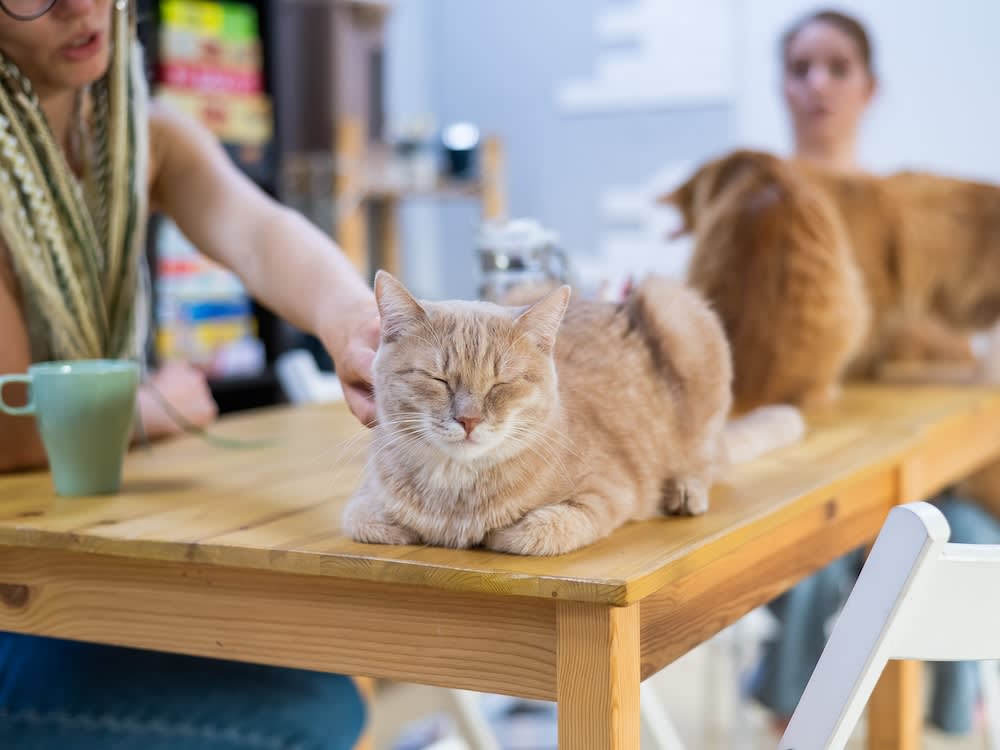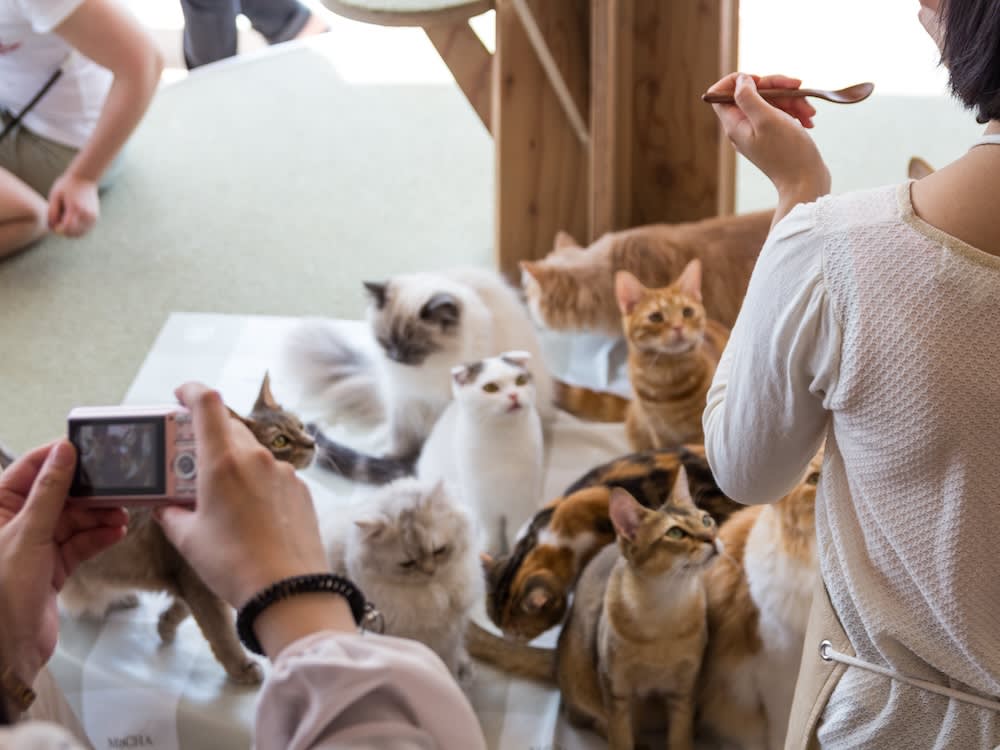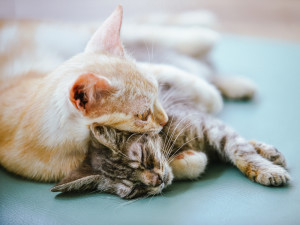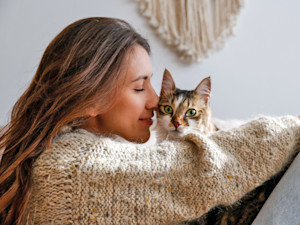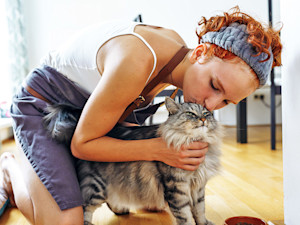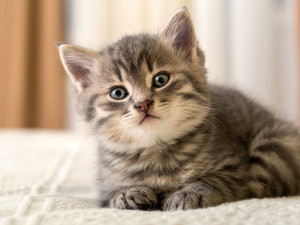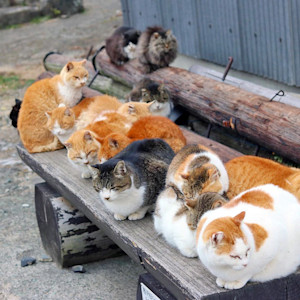Are Cat Cafes Ethical? Here’s What The Experts Say
Weighing up the pros and cons
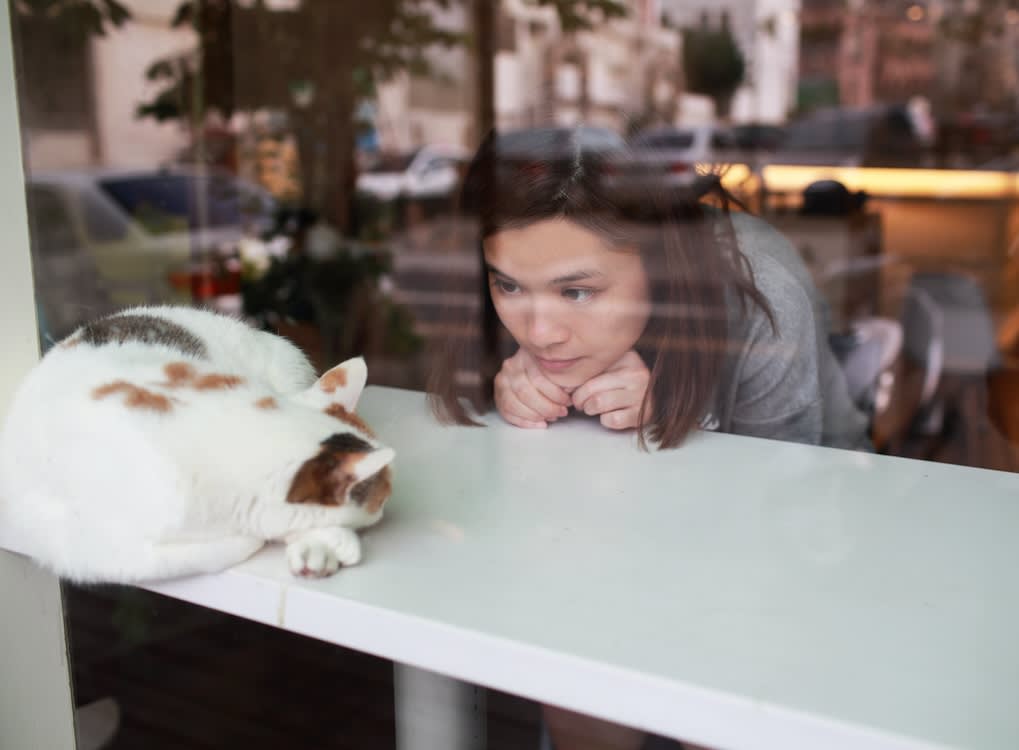
Share Article
Once a novelty, cat cafes are now something of a staple across UK. For cat lovers who can’t have a cat of their own, they are places to get their feline fix without the commitment. Some cat cafes operate as both a cat rescue and a cafe, offering more than just a room with cats for entertainment. However, earlier this year, the RSPCAopens in new tab and Cats Protectionopens in new tab called for a phase-out of cat cafes after the charities revealed a 44 percent increase in licences granted for the cafes during the last financial year.
The two leading pet welfare charities say it is “almost impossible” to meet the welfare needs of cats in this environment and therefore do not believe they should be operating.

Get (totally free) deals for food, treats, accessories, tech and way more pet parenting must-haves.
Their experts question whether the cafes are ethical because cats are independent creatures who enjoy their own space and company. However, others say the benefits cannot be ignored; especially cafes that promote adoption at a time when shelters are overflowing.
Ahead, we speak to experts to take a look at the benefits and potential pitfalls of cat cafes.
What is a cat cafe?
Cat cafes are cafes (obvs) with a small number of resident cats. Customers can watch and play with the cats for a short period, according to the cafe’s rules. Some cat cafes operate as rescues, with adoptable cats, while others have resident cats who live together when the cafe is closed.
Cat cafes have become a worldwide phenomenon after the first cat cafe opened in Taipei in 1998, and the idea was popularised in Japan in the early 2000s. The first cat cafes appeared in the UK in 2014.
Japan and South Korea now have animal cafes dedicated to everything from dogs to owls, hedgehogs to capybaras. In the UK, we’ve only got as far as dog and cat cafes.
Potential problems with cat cafes
Not everyone is happy with the success of cat cafes. Several animal welfare charities, including Cats Protection and the RSPCA, have criticised the phenomenon. “Cat cafes are not a suitable environment for cats because they are in a confined space with a revolving population of people,” says Nicky Trevorrow, behaviour manager at Cats Protection. “They need a stable environment – more so than dogs.”
Animal welfare
Generally, cats are not known to be sociable, and many felines often prefer to live without other cats or form social groups with their relatives, which raises the question of welfare in cat cafes. While some cat cafes are designed with cat welfare in mind, there are concerns about the suitability of these environments for cats, particularly due to the potential for stress, disease transmission and behavioural issues.
Alice Potter, cat welfare expert at the RSPCA, says: “We understand the appeal of cat cafes. However, we don’t believe these environments can consistently provide cats with a good quality of life and are hugely concerned that many cats will be unhappy.”
According to Potter, sharing an enclosed space and resources with many unrelated cats can lead to a range of negative feelings and emotions resulting in aggression and behavioural issues, and, “it isn’t always easy to identify whether a cat’s welfare is compromised as the signs can often be very subtle, easily missed or misinterpreted. But we fear this could be widespread in cat cafes, however well-meaning these places may be.”
Stress and overestimation
With a busy cat cafe, it can be easy to miss the signs of stress in one cat out of a crowd, particularly if that cat has withdrawn from the main area and isn’t being monitored with the rest of the cats.
Dr Aimee Warner, resident veterinarian at Waggelopens in new tab pet insurance, says chronic stress has been shown to pose a real threat to a cat’s health. She says, “Cats suffer when their environment, such as their home, has no area to plan rest. This can lead to a cat suffering through stress and overstimulation, which is often proven to correlate with health problems. These can include urinary problems, excessive grooming and weakened immunity.”
Profit over welfare?
As veterinary physiotherapist Lucy Milleropens in new tab explains, in some unfortunate cases of cat cafes, financial motivation may overshadow cats’ well-being. “I have heard of instances where there were too many cats for the space, few hiding spots, and no enrichment such as play structures or toys. It is easy to see how corners can be cut without oversight.”
Daniel Warren-Cummings, central behaviour officer for Cats Protection, added “Although many cat cafe owners start their enterprise out of a desire to help unwanted cats, they will ultimately commit themselves to having high numbers of cats to meet consumer demand, which makes it difficult to run these businesses in a way that truly protects cat welfare.”
Inadequate regulations
It isn’t mandatory to license cat cafes, which means some businesses may be completely unregulated. As Alice Potter from the RSPCA says, “Those that are inspected by local authorities are licensed under the regulations concerned with the keeping or training of animals for exhibition, as there is no cat cafe specific licence.”
That’s not to say some cat cafes aren’t operating at an optimum level, but having places where both cafes and animal shelters operate, with little-to-no guidelines or inspection protocols, increases the likelihood of some venues compromising the welfare of cats.
Arguments for cat cafes
Despite some concern from animal charities over the welfare of cats in cafes, some experts take a more positive view. “It is a difficult environment to get right, but it’s not impossible by any means,” says Andy Sparkes, veterinary director at International Cat Care.
“While cats are solitary animals, domestic cats have evolved and many can live in groups quite happily.” He adds: “I’ve seen cats in some poorly run rehoming centres, where many are confined to one room. That can be far more stressful.”
Promotes adoption
Some cat cafes also serve as adoption agencies. Lucy Miller has worked with some cat cafes that have a close partnership with reputable shelters or rescue organisations that provide shelter for the cats, as well as continuous vet care, visitor screening and offering an abundance of private space for the cats.
As Miller says, “Adoption rates from these cafes tend to be much higher than traditional shelters, as potential adopters spend quality time relaxing with the cats in an environment conducive to adoption. The other side of this adoption is that the cats are seen in their true colours rather than judged on a short viewing in a rescue environment.”
Education for customers
Warner says cat cafes can offer their visitors a safe and positive experience, helping to educate more people on how to own a cat. “By giving adoptable cats more exposure to the public, they can help people decide whether they want a cat to be part of their family.”
Cat cafes can also educate people on caring for, stimulating and entertaining indoor cats, especially if you don’t live in an area suitable for cats to roam outside.
Safe place for cats and humans alike
Other than socialising cats, Lucy Miller says cat cafes can be safe spaces for humans and felines because they limit the number of cats and humans in the cafe at any one time, supervise their group interactions, and respect each cat's comfort zone.
Many cat cafes have age restrictions, which means there’s a lower chance of unwanted interactions with children and potential cat aggression within these environments. Limited opening hours and being closed for a day or more a week means that the cats can rest and recharge without human interaction.
Cat cafes in the UK
There are around 30 licensed cat cafes in the UK, but some have since closed or are still to open. Currently, the following cat cafes are in operation in the UK:
Andover Catfeopens in new tab - Andover
Bedford Cat Cafeopens in new tab - Bedford
Kitty Cafeopens in new tab with locations in Birmingham, Leeds and Nottingham
Cafe Meowopens in new tab - Blackpool
Pause Cat Cafeopens in new tab - Bournemouth
Cat Village Northopens in new tab - Derbyshire
Pawsome Cat Cafeopens in new tab - Durham
Darling Darling Cat Loungeopens in new tab – Great Yarmouth
The Cosy Cat Caféopens in new tab – Hearne Bay
Coffee Catsopens in new tab - Lincoln
Cat Caféopens in new tab - Liverpool
Java Whiskersopens in new tab - London
Whiskers and Creamopens in new tab - London
Paws For Thoughtopens in new tab - Romsey
Tabby Teas Cat Cafeopens in new tab - Sheffield
Shakespaw Cat Cafeopens in new tab - Stratford-upon-Avon
Kittea Cakesopens in new tab - Southend
Maison de Moggyopens in new tab - Edinburgh
Meow Cafeopens in new tab - Glasgow
Purrpleopens in new tab - Glasgow
Guidelines for ethical cat cafes
The RSPCA and Cats Protection are urging the UK government to create a list identifying activities that negatively impact animal welfare and should, therefore, not be allowed to operate as part of their licensing activity review for cat cafes.
There are no official guidelines, but it is hoped that cat cafe owners would:
Ensure that the comfort and well-being of the cats come first.
Employ knowledgeable and trained staff to care for the cats, including animal handling and welfare.
Implement clear rules for visitors, such as no picking up cats, no disturbing sleeping cats and no flash photography.
Limit the number of visitors to avoid overwhelming the cats.
Final thoughts: are cat cafes ethical?
Aimee Warner says it is possible to run an ethical cat cafe, but, “They should be supervised in a professional manner, with animal welfare as a primary concern. Well-managed cat cafes can offer a safe and positive experience for their visitors. Managed ethically and with systems for veterinary care, socialisation, and resting areas, these spaces can provide adoption opportunities while educating the public on cat behaviour and linking rescue organisations to conscientious pet owners.”
Frequently asked questions about cat cafes
Are cat cafes ok for cats?
Some animal welfare professionals believe cat cafes are stressful environments for cats, as there is the potential for stress, disease transmission and behavioural issues in the cats who reside there.
How sanitary are cat cafes?
As cat cafes serve beverages and possibly food, they must maintain a hygienic environment, often adhering to the same hygiene standards as regular cafes and restaurants. For the environment to stay sanitary, cat cafes implement measures such as separate food preparation areas, regular cleaning of surfaces and litter boxes, and often require hand sanitising or shoe covers before entering the cat area.
What is the risk of a cat cafe?
Poorly run cat cafes may pose a risk to the cats’ health if they are not adequately cared for, as they may suffer from stress and poor health. There should be minimal risk to humans as long as hygiene rules are followed.

Catherine Renton
Catherine Renton is a writer based in Edinburgh whose work has been featured in Vogue, Elle, Glamour, Refinery29, and the Guardian, among others. When she's not writing, she is tending to the every whim of her cocker spaniel Bonnie, who loves belly rubs, people and chasing squirrels.
Related articles
![Picture of a woman with brown hair hugging a cat]()
How to Adopt a Cat in the UK
Rescue cats are the best cats
![woman kissing a cat]()
How to Temporarily Foster a Cat in the UK
Give the gift of a temporary home to a kitty in need
![Kitten sitting on a blanket]()
7 Steps to Keep Your New Kitten Happy and Healthy
A vet breaks down everything you need to know when you bring home a new kitten
![Several cats lying on a bench]()
Welcome to Cat Island: Where Feline Residents Outnumber Humans 20 to 1
For cat lovers, it’s nothing short of paradise
